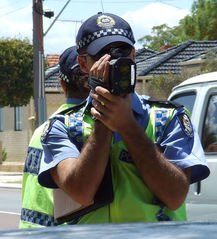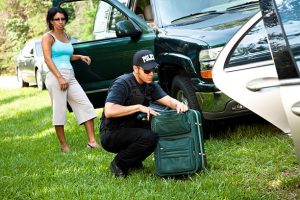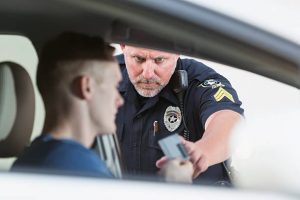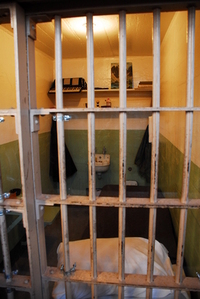 Last week I had a meeting with a client in my office in Schaumburg who was being charged with a felony in Rolling Meadows. The client has a lawyer who was representing him for the case. The client came in for a consultation because he was not happy with the services that his current lawyer was providing and was considering hiring me to represent him in the case. The client told me that he had spoken to his lawyer and requested copies of the police reports. His lawyer refused to provide copies of the police report and the client was very upset with that decision.
Last week I had a meeting with a client in my office in Schaumburg who was being charged with a felony in Rolling Meadows. The client has a lawyer who was representing him for the case. The client came in for a consultation because he was not happy with the services that his current lawyer was providing and was considering hiring me to represent him in the case. The client told me that he had spoken to his lawyer and requested copies of the police reports. His lawyer refused to provide copies of the police report and the client was very upset with that decision.
This is a very common scenario. I frequently talk with clients who want copies of the police reports so that they can review them at home with their friends and family. I’m sure that many of those clients want to talk to another lawyer and get a second opinion. When a criminal defense lawyer tells a client that they cannot give them copies of the police reports, the clients usually think that’s because the lawyer doesn’t want to lose the case. While that may be the reason behind refusing to give a client police reports in some cases, people need to understand that your criminal defense lawyer is prohibited from giving you copies of the police reports. Let me explain why.
Your lawyer is required to follow certain rules. Your lawyers’ conduct is governed by the Rules of Professional Responsibility. Those rules provide for certain ethical responsibilities that lawyers have to their clients and to the Court. The Supreme Court of Illinois has also enacted certain rules which limit what your lawyer can, or cannot do. The Supreme Court Rules govern what happens in court and what your lawyer can or cannot do while they are representing you in a criminal case in court. Your lawyer is required to follow all those rules.
 Chicago Criminal Lawyer Blog
Chicago Criminal Lawyer Blog











 In the past several weeks, I have spoken to several clients who were arrested for Aggravated or Excessive Speeding and were charged with a crime. Most of the people I spoke to did not realize that they could be arrested for speeding. Many people do not understand the Illinois speeding laws and how a simple speeding ticket can lead to you being arrested and facing the real possibility of having a criminal conviction appear on your record and a possible jail sentence in your future. I want to take this opportunity to try to help people understand just how drastic the consequences of a speeding ticket in Illinois can be.
In the past several weeks, I have spoken to several clients who were arrested for Aggravated or Excessive Speeding and were charged with a crime. Most of the people I spoke to did not realize that they could be arrested for speeding. Many people do not understand the Illinois speeding laws and how a simple speeding ticket can lead to you being arrested and facing the real possibility of having a criminal conviction appear on your record and a possible jail sentence in your future. I want to take this opportunity to try to help people understand just how drastic the consequences of a speeding ticket in Illinois can be. It is common to have a client come into my office who is facing criminal charges resulting from a search of their vehicle by a police officer. Many of those clients want to know whether the police had the right to search their vehicle and whether I can have the evidence that was recovered thrown out of Court. There’s no simple answer to this question. Whether the police had the right to search the vehicle and whether I can convince the Court to throw out the evidence depends on the facts of each individual case. I want to talk a little bit about the general rules and what the constitutional limits are when it comes to the police searching a motor vehicle.
It is common to have a client come into my office who is facing criminal charges resulting from a search of their vehicle by a police officer. Many of those clients want to know whether the police had the right to search their vehicle and whether I can have the evidence that was recovered thrown out of Court. There’s no simple answer to this question. Whether the police had the right to search the vehicle and whether I can convince the Court to throw out the evidence depends on the facts of each individual case. I want to talk a little bit about the general rules and what the constitutional limits are when it comes to the police searching a motor vehicle. Being pulled over by a police officer is a stressful experience. This is especially true if you know that you have been drinking alcohol. Your mind starts racing and you want to make sure that you don’t give the police officer any reason to suspect that you are under the influence of alcohol. Unfortunately, many motorists don’t really think before they open their mouth. They don’t realize that the police are not there to help them. The police have a job to do and their job begins the moment they notice your vehicle. You need to understand what the police officer is doing and how your conduct and your statements can be used against you in court.
Being pulled over by a police officer is a stressful experience. This is especially true if you know that you have been drinking alcohol. Your mind starts racing and you want to make sure that you don’t give the police officer any reason to suspect that you are under the influence of alcohol. Unfortunately, many motorists don’t really think before they open their mouth. They don’t realize that the police are not there to help them. The police have a job to do and their job begins the moment they notice your vehicle. You need to understand what the police officer is doing and how your conduct and your statements can be used against you in court. Yesterday, Kane County State’s Attorney, Joe McMahon, announced that Kane County saw a 7% increase in the number of felony cases filed by the Kane County State’s Attorney’s Office in 2017. The increase in the filing of felonies in Kane County continues a rise in the number of felony cases filed that began in 2015. In 2007, Kane County saw 3,349 felony cases filed. That number declined from that year until 2015, when 2,011 felony cases were filed in Kane County. In 2016, 2,255 felony cases were filed. In 2017, 2,413 felony cases were filed. That represents a 7% increase over 2016.
Yesterday, Kane County State’s Attorney, Joe McMahon, announced that Kane County saw a 7% increase in the number of felony cases filed by the Kane County State’s Attorney’s Office in 2017. The increase in the filing of felonies in Kane County continues a rise in the number of felony cases filed that began in 2015. In 2007, Kane County saw 3,349 felony cases filed. That number declined from that year until 2015, when 2,011 felony cases were filed in Kane County. In 2016, 2,255 felony cases were filed. In 2017, 2,413 felony cases were filed. That represents a 7% increase over 2016. One of the most common questions I get asked by people who are charged with a Domestic Battery is whether they can be guilty of a Domestic Battery if they did not hit anyone. The short answer to that question is yes. But let’s talk a little about what a Domestic Battery is and why it is very important that you hire a good Illinois Domestic Battery lawyer who knows what they are doing.
One of the most common questions I get asked by people who are charged with a Domestic Battery is whether they can be guilty of a Domestic Battery if they did not hit anyone. The short answer to that question is yes. But let’s talk a little about what a Domestic Battery is and why it is very important that you hire a good Illinois Domestic Battery lawyer who knows what they are doing. Last June, the United States Supreme Court issued a decision in a DUI case that many DUI lawyers had been closely following. The case is actually three separate cases consolidated into one case captioned, Birchfield v. North Dakota. What united all 3 cases was that they all dealt with a North Dakota law which made it an actual crime to refuse to take a breathalyzer test and a blood test when requested to do so by the police. There is no such law in Illinois. A refusal to take a breathalyzer test or blood test can result in the suspension of your driving privileges in Illinois but is not an actual crime in Illinois. However, 13 other states make a refusal to submit to a breathalyzer test or blood test a crime. Both North Dakota and Illinois have “implied consent” laws which means that when you operate a motor vehicle upon the public roads, you consent to submitting to a breathalyzer and a blood test when requested to by the police. Illinois warns you that failure to consent to a breathalyzer test could result in the suspension of your driving privileges while North Dakota warns you that failure to consent to a breathalyzer test could result in criminal prosecution. Refusing to submit to a breathalyzer or a blood test is not a crime in Illinois. The refusal to submit to such testing can only result in the suspension of your license for a period of time, usually one year, if this is your first DUI. Sometimes, refusing to submit to a breathalyzer or blood test could benefit the underlying DUI case making it harder for the state to prove their case with test results, but will not stop the suspension of your driver’s license. Refusing to submit to a breathalyzer test or a blood test is a misdemeanor in North Dakota. By making it a crime to refuse to submit to a breathalyzer or a blood test, a driver would be more likely to consent to such testing, thereby making it easier for the state to prove guilt in an underlying DUI prosecution.
Last June, the United States Supreme Court issued a decision in a DUI case that many DUI lawyers had been closely following. The case is actually three separate cases consolidated into one case captioned, Birchfield v. North Dakota. What united all 3 cases was that they all dealt with a North Dakota law which made it an actual crime to refuse to take a breathalyzer test and a blood test when requested to do so by the police. There is no such law in Illinois. A refusal to take a breathalyzer test or blood test can result in the suspension of your driving privileges in Illinois but is not an actual crime in Illinois. However, 13 other states make a refusal to submit to a breathalyzer test or blood test a crime. Both North Dakota and Illinois have “implied consent” laws which means that when you operate a motor vehicle upon the public roads, you consent to submitting to a breathalyzer and a blood test when requested to by the police. Illinois warns you that failure to consent to a breathalyzer test could result in the suspension of your driving privileges while North Dakota warns you that failure to consent to a breathalyzer test could result in criminal prosecution. Refusing to submit to a breathalyzer or a blood test is not a crime in Illinois. The refusal to submit to such testing can only result in the suspension of your license for a period of time, usually one year, if this is your first DUI. Sometimes, refusing to submit to a breathalyzer or blood test could benefit the underlying DUI case making it harder for the state to prove their case with test results, but will not stop the suspension of your driver’s license. Refusing to submit to a breathalyzer test or a blood test is a misdemeanor in North Dakota. By making it a crime to refuse to submit to a breathalyzer or a blood test, a driver would be more likely to consent to such testing, thereby making it easier for the state to prove guilt in an underlying DUI prosecution. Recently, I won a Source of Funds hearing at the Maywood Courthouse. At my client’s initial bond hearing, the judge required that my client prove the source of funds prior to being allowed to post the required amount of the cash bond. Immediately after the bond hearing I was contacted by my client’s family and hired to do whatever I could to get my client out of jail. I immediately got to work and today, my client is a free man. Here’s how this case started and how I was able to get him released.
Recently, I won a Source of Funds hearing at the Maywood Courthouse. At my client’s initial bond hearing, the judge required that my client prove the source of funds prior to being allowed to post the required amount of the cash bond. Immediately after the bond hearing I was contacted by my client’s family and hired to do whatever I could to get my client out of jail. I immediately got to work and today, my client is a free man. Here’s how this case started and how I was able to get him released. Many times when someone is arrested and charged with a Domestic Battery the Court will issue an Order of Protection that seeks to protect the person claiming to be abused (Petitioner) from being harmed or harassed by the person who is being charged with the Domestic Battery. When I have a client (Respondent) that has an Order of Protection entered against them they often get confused and do not fully understand what this means and what they can and cannot do. I want to discuss what an Order of Protection is and what you need to do to protect yourself from Violating the order and getting into deeper trouble.
Many times when someone is arrested and charged with a Domestic Battery the Court will issue an Order of Protection that seeks to protect the person claiming to be abused (Petitioner) from being harmed or harassed by the person who is being charged with the Domestic Battery. When I have a client (Respondent) that has an Order of Protection entered against them they often get confused and do not fully understand what this means and what they can and cannot do. I want to discuss what an Order of Protection is and what you need to do to protect yourself from Violating the order and getting into deeper trouble. This is one of the most common questions I get asked by people that have been arrested and charged with a Retail Theft. When I get asked that question, that’s when I start asking questions. Because whether or not they committed a Retail Theft depends on the specific facts of their case. Most of the time they tell me that they forgot to pay for an item that they had mistakenly placed in their purse or in a bag. Some people tell me that their child took an item and hid it from them without them knowing. Other people tell me they tried on a piece of jewelry and forgot to take it off. Whatever the explanation is, many of them tell me that they don’t understand how they could be charged with stealing something from a store if they did not physically leave the store when they were stopped by security.
This is one of the most common questions I get asked by people that have been arrested and charged with a Retail Theft. When I get asked that question, that’s when I start asking questions. Because whether or not they committed a Retail Theft depends on the specific facts of their case. Most of the time they tell me that they forgot to pay for an item that they had mistakenly placed in their purse or in a bag. Some people tell me that their child took an item and hid it from them without them knowing. Other people tell me they tried on a piece of jewelry and forgot to take it off. Whatever the explanation is, many of them tell me that they don’t understand how they could be charged with stealing something from a store if they did not physically leave the store when they were stopped by security.